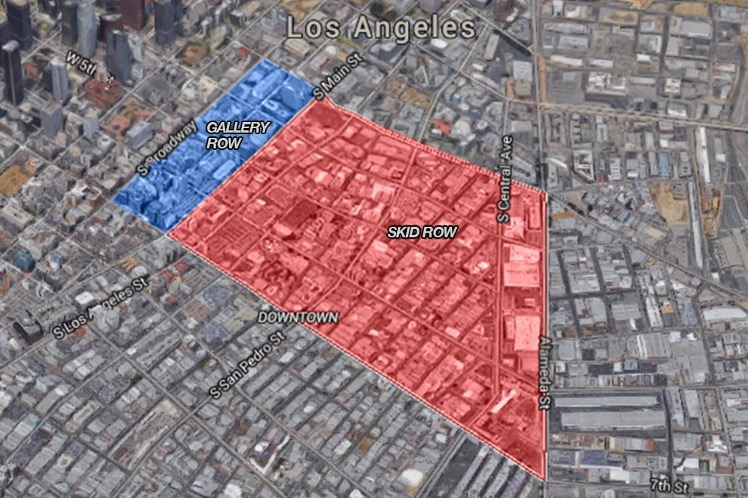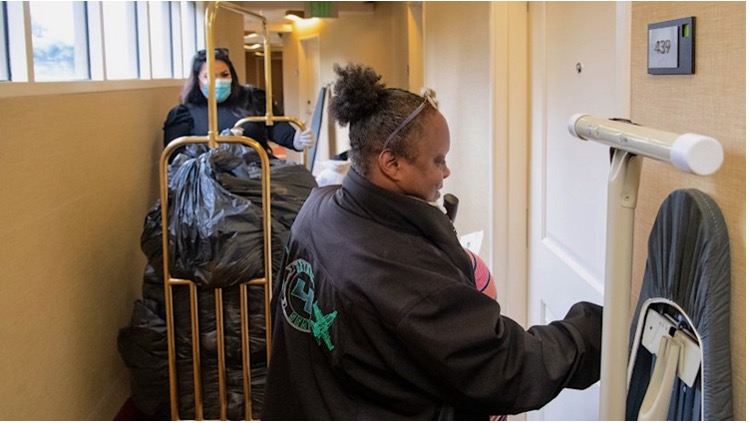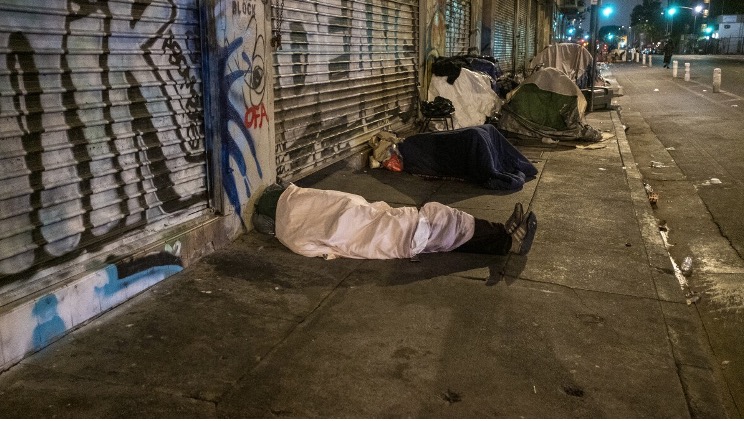CommentsTHE EASTSIDER - Back in the 90’s, I was living in a Loft at the Brewery in Lincoln Heights, and working downtown.
It was a thriving area, and not too far away was Skid Row. My recollection is that it was a place of total contrast, from the Garment District to Skid Row, up to Little Tokyo.
Recently, I started to wonder if their way of all living together isn’t a possible roadmap to help us understand how we could integrate these vast differences into areas where the homeless and business and apartments and SRO’s can all co-exist.
A lot of my understanding about Skid Row comes from the writings and interactions with General Jeff, who was CityWatch’s lead writer about the area. In early 2016, he noted:
“Here in Skid Row, also known as “the homeless capitol of America,” the majority of the homeless and low-income population suffering from extreme poverty are African-Americans. On the other end of the spectrum, almost all of the Executive Directors and CEOs of the Skid Row non-profits are whites and non-Blacks.
There is an obvious financial discrepancy between races and blatant the reasons why these differences extend into much deeper dimensions -- especially when one recalls the existence of a “Skid Row Containment Zone Policy” in the 1970’s…followed by the 1980’s crack cocaine epidemic…which combined to drive Blacks to Skid Row in droves.”
Key to Skid Rows identity is the large number of “SROs”, or ‘single room occupancy’ hotels which were largely preserved from demolition in the 1970’s, when the leveling of Bunker Hill Victorians in the name of “Urban Renewal” spurred activists to protect Skid Row from a similar fate. Most area SROs (which date back to the early 1900’s), were purchased by either SRO Housing Corporation, formed by the CRA in 1984 or Skid Row Housing Trust, formed by Episcopal priest and a former nun Alice Callaghan (who is no longer affiliated with SRHT) in 1989. These SROs allow those in need to rent a room and get off the street. Ultimately, just like the City’s current Project Roomkey program, it all wound up as a debacle. As General Jeff wrote in mid 2016:
“YES, blood is on the hands of Skid Row Housing Trust.
They owe us all a public apology. Their housing model DID NOT WORK as initially intended and after nearly 30 years of being in denial, are FINALLY changing their course, of which their mission statement claims to provide an environment in which “people who have experienced homelessness, prolonged extreme poverty, poor health, disabilities, mental illness and/or addiction can lead safe, stable lives in wellness.”
HOW COULD THIS HAVE BEEN POSSIBLE PRIOR TO NOW?
And to think of all the awards Skid Row Housing Trust has received over the decades as they falsely claimed to be “experts” on homelessness. ”

DLANC and Skid Row
Just in case you think that Neighborhood Council boundaries were based on what the various parts of LA wanted, let me disabuse you of the very thought. Here's how it worked for Skid Row.
“Most of us who were around when the Neighborhood Councils were first formed knew how DLANC (the Downtown NC) was set up was to “manage” Skid Row. As early as 2014, the Skid Row NC Formation Committee was created to try and get out of the DLANC, as downtown real estate values soared and the plight of the homeless tanked.
In January 2017, DONE (Department of Neighborhood Empowerment) sent the formation committee the approval and a notice calling for an election, with the unprecedented language that their election “may also include online voting.” We already knew the establishment of DLANC and HCNC (Historic Cultural Neighborhood Council) were well funded to take them out when their front group, United Downtown, or Unite DTLA, was represented by former City Attorney Rocky Delgadillo’s law firm.
He sent a 10-page letter to BONC (as well as to Garcetti, Feuer, Huizar, Grayce Liu and DONE’s City Attorney, Darrren Matrinez.) You can find a link to his letter in an article here.
When all of this didn’t work, Jose Huizar himself slammed through online voting just for this election, with about two weeks to go before the vote. You have to wonder how many homeless voters had access to any of this tech – as opposed to their opponents with their iPhones, social media chops, and political clout.
Unsurprisingly, the Skid Row Formation Committee lost its bid in an amazingly close election, considering the forces lined up against them. The final tally included over 1600 votes cast, with Skid Row losing by a mere 62 votes.”
It’s a little beyond the scope of this article to go into the years of litigation that the Skid Row Formation Committee had against the City for literally putting in the fix against Skid Row getting their own Neighborhood Council. Kudos to General Jeff and Katherine Mcnenny for spending countless hours trying to obtain justice against a crooked DONE and developer front Jose Huizar For those who are interested, you can get a taste here:
“His pathetic manipulations of the NC Subdivision Ordinance, along with camp follower Grayce Liu, have gotten the Skid Row folks so angry that they have now sued the whole bunch!
I am looking at a copy of the 3rdAmended Petition for Writ of Mandate, Administrative Mandate and Declaratory Relief, provided to me by the Skid Row NC Formation Committee. Don’t be intimidated by the huge file size. The real meat is contained in the first 48 pages and is well worth the read.
Personally, I find it all a fascinating read, and I guess indicative of the fact that if you want DONE and Jose Huizar to behave honestly and follow their own rules, you have to sue them. Sad indeed, but no surprise to all too many of us.
The substance of the suit is that the City colluded with DONE and the Downtown Neighborhood Council (the business umbrella NC for downtown), as well as its lobbyists, to rig the Skid Row election and guarantee failure. Why? How about “clearing the streets for more profitable development and the 2028 Olympic Games.”
About Project Roomkey
General Jeff continued to be a champion for Skid Row and very clear eyed at the LAHSA pitiful attempts to tell the rest of us how wonderful their efforts were to help the homeless. For example, here’s General Jeff’s analysis of Project Roomkey in 2020:
“ Another City-provided "solution" to both the global pandemic and the federal lawsuit is Project Roomkey, in which homeless persons are moved into hotel and motel rooms.
This is a perfect example of "the trickery" of politics. Both the State of California and the City of Los Angeles have separate solutions called Project Roomkey. When it's convenient, they each borrow the data from the other program to give "false-positive" indicators to imply the program's level of success.
Even with that, no matter from which direction one looks at these "solutions," they are significantly underperforming. Each were announced as providing 15,000 hotel/motel rooms (which technically would be 30,000 total), but the actual numbers (combined) are 3,700 rooms that are currently filled statewide. No Skid Row-specific data exists or has been made available to us.
"We, the People of Skid Row" have been fighting against this system since its inception”

For those who never heard of General Jeff, here’s a link to the CityWatch article upon his death in 2021. I urge you to read it, to gain an idea of what homeless entities like Skid Row are, and are not, as well as the City’s failures to do anything but help out developers.
The Takeaway
First, a hat tip for Katherine Mcnenny for the SRO history in the article, and to General Jeff for everything he did to try and preserve Skid Row against politicians, developers, and ill-advised police initiatives. He will be missed.
The reason I wrote this piece is that it seems to me that how Skid Row operated, before the City and the County politicians screwed everything up, might have stood out as a model for how homeless, housed, and working parts of a neighborhood can work together.
It also stands as a lesson of what politicians selling out brings - like LAHSA.
(Tony Butka is an Eastside community activist, who has served on a neighborhood council, has a background in government and is a contributor to CityWatch.)















